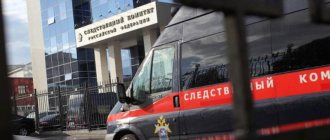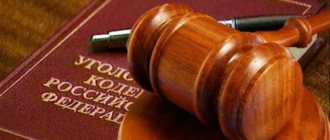All bodies and persons vested with rights and responsibilities in criminal proceedings, called upon to perform functions specified by law in initiating, investigating and resolving specific cases, are called participants in criminal proceedings.
They are classified according to their legal significance and function into main and other subjects of the process. The first group includes: the court, the prosecution and defense. Witnesses, experts, specialists, translators and witnesses play an auxiliary role in the proceedings.
Criminal justice authority
course work on this topic
Criminal law.
The general part is more detailed, only the court has the right to consider criminal cases and make sentences on the basis of which guilty persons can be subject to criminal punishment. And this power is granted only to courts of general jurisdiction. Are you an expert in this subject area?
We offer to become the author of the Directory Working Conditions Along with the responsibilities directly related to the administration of justice, these authorities must also monitor the legality and validity of the actions and decisions of law enforcement agencies.
The allocation of judges to an independent group of participants in criminal proceedings is due to the procedural function they perform in resolving the case.
When analyzing the specifics of the powers of the court, it is important to take into account that it also plays an important role at the stage of execution of sentences. This authority, for example, has the right to toughen the punishment in case of malicious evasion from serving it or to release the convicted person from prison due to illness.
Another type of control powers of the court concerns the consideration of complaints caused by the disagreement of interested parties with the investigative actions taken or the verdict passed.
At the pre-trial stages of the criminal process, the court has a real opportunity to actively eliminate the negative consequences of illegal and unreasonable actions and decisions of law enforcement agencies. Thus, the constitutional rights and freedoms of citizens are protected.
Finished works on a similar topic
Course work Participants in criminal proceedings 450 ₽ Abstract Participants in criminal proceedings 250 ₽ Test work Participants in criminal proceedings 220 ₽
Receive completed work or specialist advice on your educational project Find out the cost
In connection with the general characteristics of the status of the court in criminal proceedings, it should be noted that the law recognizes the high authority of its decisions (rulings, orders or sentences). After entering into legal force, they are subject to strict execution on the territory of the Russian Federation. We have already completed an abstract
Statehood of Russia. in more detail by all participants in legal proceedings, state authorities and local governments, public associations and officials. That is, court decisions are generally binding.
Figure 1. Participants in criminal proceedings. Author24 - online exchange of student work
General rights
The procedural status of a person includes a certain list of possibilities, the implementation of which is guaranteed by law. This includes the rights:
- respect for dignity and honor;
- freedom and security;
- secrecy of negotiations, correspondence;
- personal safety;
- give explanations and testimony;
- do not testify against loved ones and yourself;
- make statements;
- make complaints in a language the subject speaks;
- use the services of a translator for free;
- receive protection and qualified legal assistance;
- appeal procedural decisions and actions of the prosecutor, investigator, court;
- demand compensation for damage caused by unlawful actions and decisions of officials.
Subjects participating in the process, both on the prosecution and defense sides, have equal rights to carry out evidence. They can collect and provide supporting documents and other materials, participate in their study and analysis, and apply for investigative actions. At the same time, procedural status as a set of legal possibilities provides each subject with the protection of its specific interests.
Prosecution
Participants in criminal proceedings on the part of the prosecution are:
- prosecutor;
- investigator;
- interrogator;
- the victim or his legal representative;
- private prosecutor;
- civil plaintiff.
A prosecutor is a person authorized to carry out criminal prosecution on behalf of the state, as well as oversee the legality of the procedural activities of the bodies of inquiry, preliminary investigation and some other participants in legal proceedings.
The official conducting the preliminary investigation of criminal cases is called an investigator. He must identify the guilty person and establish all the circumstances of the crime committed.
The investigator conducts a preliminary investigation in the form of an inquiry. The range of rights and responsibilities of this participant in criminal proceedings largely coincides with the powers of the investigator, with the only difference being that the procedural independence of the investigator is significantly limited. For example, he is obliged to follow the instructions of the prosecutor given in accordance with the requirements of the Code of Criminal Procedure of the Russian Federation.
The victim can be either an individual or a legal entity who has suffered significant harm (physical, property or moral) as a result of a crime. In some cases, the interests of the victim are represented by his closest relative, adoptive parent or guardian. For example, if the person affected by the crime is a minor or incompetent.
A private prosecutor is a citizen who has applied to the court with a demand to prosecute a person who has committed one of the following crimes against him:
- intentional infliction of minor harm to health (Article 115 of the Criminal Code of the Russian Federation);
- beatings (Article 116 of the Criminal Code of the Russian Federation);
- libel (part 1 of article 129 of the Criminal Code of the Russian Federation);
- insult (Article 130 of the Criminal Code of the Russian Federation).
Definition 1
A civil plaintiff is an individual or legal entity that has suffered property or moral damage as a result of a crime and has filed a claim against the accused for compensation for the damage caused.
Expert
The basis for involving this person in the case is a resolution of the body conducting the relevant criminal proceedings.
The procedural status of an expert has a number of features that distinguish it from the position of other participants in the case. Firstly, the legislation establishes requirements for the subject, failure to comply with which leads to recusal. We are talking, in particular, about the incompetence of a person, his being in official or other dependence on any party or its representative, as well as the circumstances enshrined in Art. 61 Code of Criminal Procedure.
One of the key elements of the procedural status of an expert is his independence. This means that the subject cannot formulate conclusions on questions asked to him under the influence of someone else’s opinion. He must be independent in his assessments, otherwise his conclusion cannot be considered competent.
Defense side
In criminal proceedings, the defense is represented by:
- suspect;
- accused;
- legal representative of the minor accused;
- defender;
- civil defendant.
A suspect is a person who has been detained pending charges and against whom a criminal case has been initiated. If evidence is collected in relation to this subject of criminal proceedings confirming his guilt in committing a crime, he will become an accused.
In accordance with the Code of Criminal Procedure of the Russian Federation, the suspect has the right:
- know what he is suspected of;
- testify about the suspicion against him or refuse to testify;
- be interrogated no later than 24 hours from the moment of actual detention;
- notify one of the relatives about the fact of detention;
- use the assistance of a defense lawyer and meet with him confidentially before the first interrogation;
- protect yourself by all means and methods not prohibited by law.
An accused in whose criminal case a trial has been scheduled is called a defendant. And the accused, against whom a guilty verdict is passed, is convicted; if the verdict is acquitted, he is acquitted.
The legal representative of a minor suspect or accused may be one of his parents, adoptive parents, guardians or a representative of the institution in whose care the teenager is.
A defense attorney is a person who, in accordance with the procedure established by law, protects the rights and interests of a suspect or accused and provides him with legal assistance in criminal proceedings. The defense attorney helps to identify circumstances that justify the suspect or accused, mitigate his responsibility or relieve him from punishment.
The participation of a lawyer in legal proceedings is one of the important criminal procedural guarantees of respect for the rights and legitimate interests of the accused (suspect).
Civil defendant - an individual or legal entity who is responsible for harm caused by a crime, in accordance with the Civil Code of the Russian Federation. We have already completed coursework
Coursework. Civil law in more detail.
Procedural rules
The moment of bringing a subject into proceedings in the status of an accused is extremely important to ensure his interests and rights, which must be guaranteed by the strict procedure enshrined in the Criminal Procedure Code. The official conducting the proceedings is obliged to bring charges against the subject within three days from the date of the relevant decision. The investigator notifies the citizen of the day he will be brought into the case as an accused and explains the possibility of independently inviting a lawyer or petitioning for the appointment of a public defender.
A person in custody is notified of procedural decisions made through the administration of the institution in which he is located.
Specialist
This subject is an independent participant in production. The procedural status of a specialist determines the nature of the person’s activities. At the same time, it influences the specifics of relations with other participants in production.
A specialist is a person with certain knowledge who is involved in the proceedings in the manner prescribed by the Code of Criminal Procedure. He assists in the discovery, securing, and seizure of documents and objects, the use of technical means, the study of case materials, posing questions for the expert, and explaining to the court and the parties issues within his competence.
Prosecutor
Like other subjects carrying out criminal procedural activities, this official is obliged to receive a message about an impending or committed crime and verify it. Within the period established by law, the prosecutor decides on the initiation of proceedings, refusal to do so, or transfer of materials according to jurisdiction or jurisdiction.
The peculiarity of the procedural status of the prosecutor is that this subject is vested with very extensive powers, which are exercised both at the pre-trial stage and during the trial. The official supervises compliance with the law by the preliminary investigation bodies.
The procedural status of the prosecutor is limited exclusively by the framework of regulations. The supervision exercised by this official acts as the most important guarantee of respect for the rule of law, the interests and rights of citizens when accepting, verifying, and resolving allegations of crimes. The tasks of the prosecutor include identifying, eliminating and preventing violations of procedural legislation on the part of interrogators and investigators, taking measures within their competence to restore rights infringed as a result of these violations.
Investigator
He is the official entrusted by law with carrying out the preliminary investigation. The procedural status of the investigator also includes the right to consider reports of crimes committed or being prepared, and to make decisions on initiating proceedings or refusing to do so.
The main responsibilities of the official include:
- solving a crime;
- detection, identification, exposure of persons involved in the attack;
- identification of circumstances and factors that contributed to the commission of an unlawful act.
Despite the fact that the investigator’s procedural status presupposes that he is endowed with extensive rights, his activities are under the constant control of higher-ranking officials, as well as the prosecutor. He makes his own decisions and is fully responsible for their legality.
Representatives
These persons are endowed with almost the same powers as the participants in the production on whose behalf they act.
Representatives acquire procedural status at the moment they enter into a case and present documents confirming their authority (power of attorney, for example). These subjects have the right:
- get acquainted with production materials, make copies and extracts;
- submit petitions, complaints, challenges;
- ask other participants questions;
- give written or oral explanations to the court;
- present your own arguments on issues arising during the proceedings, object to the requests of other persons;
- appeal decisions and decisions of officials, etc.







